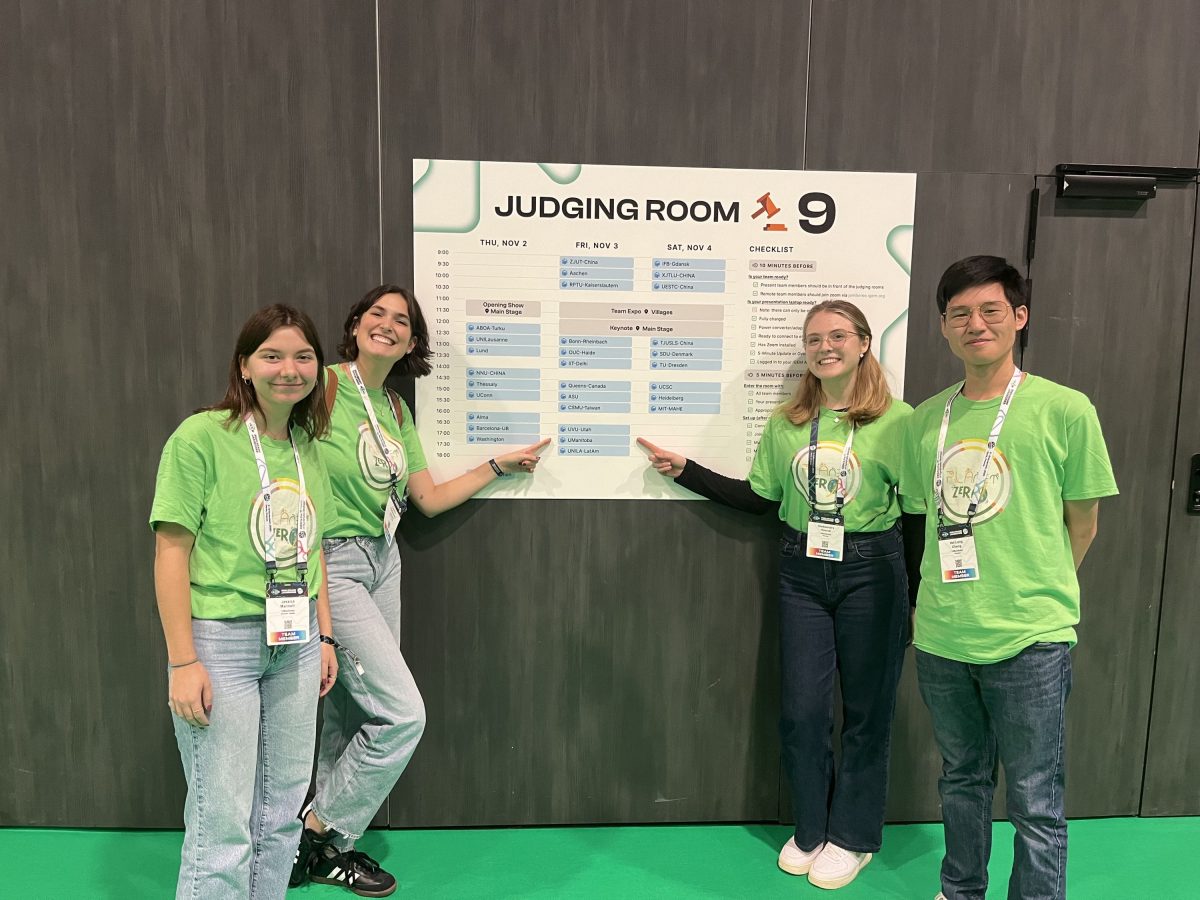
iGEM UManitoba student group. Jessica Marinelli, Camille Prefontaine, Oleksandra Havruk and Louis Cheng.
The planet is paying for your iced coffee but it doesn’t have to
UM students take the innovative route to compost PLA bioplastics.
Done with your iced coffee? Now what? Recycle, trash, or compost?
“Businesses in Manitoba have been switching to the compostable polylactic acid (PLA) bioplastic as a “green” alternative to single-use plastics. But the reality is not that simple”, says Jessica Marinelli and Camille Prefontaine. Marinelli [BScHons/2022] is a MSc student in Chemistry and Prefontaine is a 5th-year student in the BSc Honours Biology program in the Faculty of Science. They are part of the International Genetically Engineered Machine (iGEM) student group at the University of Manitoba. Their team recently presented Project PLAnet Zero at the iGEM 2023 Grand Jamboree in November 2023, won a silver medal, and was nominated for best part collection in the overgrad category.
1. What got you interested in improving PLA plastic breakdown in local composting systems?
As the Canadian government has started to phase out petroleum-based plastics to reduce carbon emissions and plastic waste in landfills, businesses in Manitoba have been switching to compostable polylactic acid (PLA) bioplastic as a “green” alternative. But the reality is not that simple. Degradation of PLA requires specific temperature and moisture conditions, challenging to maintain in our local composting facilities, especially during dry cold winters. In many cases, PLA does not break down effectively and is diverted to landfills.
After meeting with waste management experts, we saw this as the perfect opportunity to develop a bio-based solution that would help ensure “sustainable” plastic ends up where it belongs, in the compost!
2. Can you tell me about your solution?
At the core of our solution is the use of enzymes to digest PLA on the molecular level. Enzymes are biomolecules that help break down and build up materials.
To reduce the cost, we engineered a bacterial organism to make PLA-degrading enzymes and display them on the bacterial surface. Doing this will allow the enzymes to directly come into contact with PLA plastics and not be made inside bacteria cells which would require a lengthy and expensive separation process to purify them. Our whole-cell approach avoids this and enables cost-effective PLA plastic breakdown in local composting facilities.
To increase the efficiency and effectiveness of enzymatic degradation of PLA, we expanded nature’s toolset of amino acids. All living cells use the same standard 20 canonical amino acids to make proteins. Our team went beyond this set of 20 amino acids and used novel amino acids (non-canonical amino acids) to improve PLA-degrading enzymes. We use an amino acid called norleucine to help our enzymes bind better and break down materials faster and more efficiently. Our improved enzymes can allow for effective breakdown in the lower temperature conditions of food compost.
We worked on our solution alongside many experts and stakeholders in the waste management and composting community in Manitoba. Their feedback has been valuable and integral to our project. Our team is excited to continue building these partnerships to help us further develop PLAnet Zero in the next iGEM cycle.
3. Can you tell me about the award and what it means to you and your team to have won a silver medal and to have been nominated for best part collection in the overgrad category?
We are very proud of our Prairie iGEM team members for our silver medal win! We have all put so much work into this project over the past year and it was great to see our hard work pay off. To put this in context, our achievement is on par with leading Canadian institutes such as McMaster University and Queen’s University as well as top global institutes such as MIT and Harvard University. We have all put so much work into this project over the past year and it was great to see our hard work pay off.
This year, we were also nominated for best part collection (the development of a coherent group of parts that have a common function or theme) for our whole-cell catalyst design. The best part collection award is challenging because it requires a coherent vision and execution of the project. We are proud to be among the final 4 nominees out of 106 teams around the world in the overgrad category. To achieve this, we worked with a series of PLA-degrading enzymes and parts for our surface-display mechanism such that they could all be used collectively or interchangeably when designing a whole-cell catalyst for plastic degradation. Our results and success have shown that students at the University of Manitoba can conduct world-class research and have a lot to offer to the international Synthetic Biology community.
Every year we have seen more and more progress as the synthetic biology community on campus grows. PLAnet Zero allowed us to bring in students across all disciplines with a passion for science and sustainability and who want to implement real change in the community. It has been a really rewarding experience to see students experience science and entrepreneurship in the real world and see the future that synthetic biology has to offer to our local Winnipeg and global communities.






